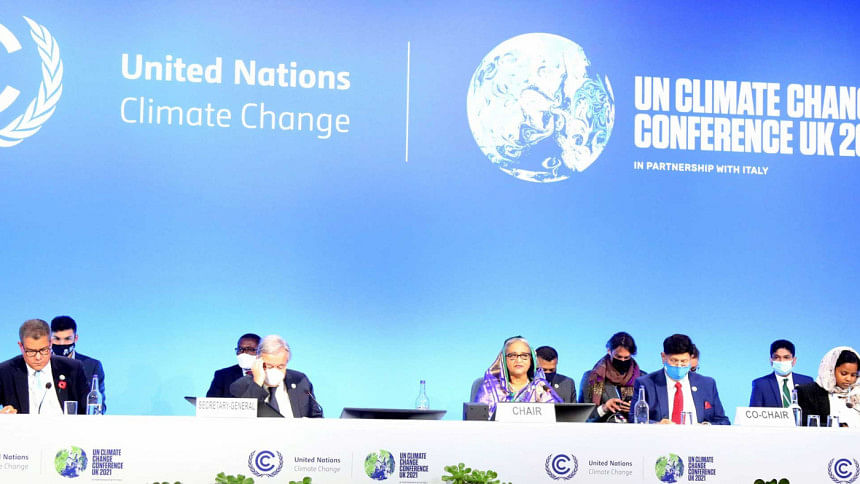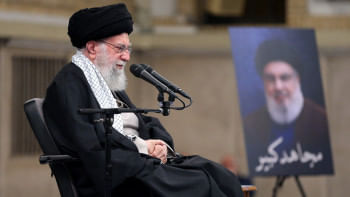Get the ball rolling to implement effective climate action

Over the last few days here in Glasgow, Scotland, over a hundred world leaders have arrived for the leaders' summit at the 26th Conference of Parties (COP26) of the United Nations Framework Convention on Climate Change (UNFCCC), to give speeches, hold meetings with UK Prime Minister Boris Johnson, and also have some bilateral meetings among themselves. They are not here at the conference to negotiate anything with each other, but to kick off the negotiations that will continue for two more weeks.
Nevertheless, their presence in Glasgow is important. Many of the leaders, during their speeches, announced new and better actions going forward. That was, indeed, a positive outcome of these discussions.
There are a few statements made by some leaders in Glasgow that stand out. The first, and by far the most important, was of course by US President Joe Biden, who brought his country back to joining the Paris Agreement, four years after his predecessor Donald Trump withdrew the US out of the agreement. This is the first COP for Biden after he assumed the US presidency, and he made some good statements about actions at home as well as enhanced funding for developing countries, especially to support adaptation activities in the most vulnerable countries.
The second important leader's statement came from Indian Prime Minister Narendra Modi as, until now, India has refused to set a date for achieving net zero emissions. In Glasgow, he finally announced that India would, indeed, achieve net zero emissions by 2070. This is longer than most countries, most of which aim to go net zero by 2050; nevertheless, it is an important commitment from an important country.
Bangladesh Prime Minister Sheikh Hasina is also here, but this year, she is not speaking just for Bangladesh, but for 48 most vulnerable developing countries, who are members of the Climate Vulnerable Forum (CVF), which she currently chairs.
She also chaired a high-level meeting of the leaders from the CVF countries who are currently in Glasgow, and they released the "Dhaka-Glasgow Declaration," which was prepared under Bangladesh's leadership and agreed upon by everyone. The declaration points out the need to keep the global temperature rise to stay below 1.5 degrees Celsius, which has yet to happen. The second demand is for the rich countries to provide USD 100 billion annually from 2020 onwards—a promise the rich countries made back in 2015, under the Paris Agreement. The developed countries failed to deliver the USD 100 billion in 2020, and again in 2021, and are now formulating a "plan" to deliver it in 2023.
The CVF's demand is that the developed countries provide a plan to deliver USD 500 billion over five years—from 2020 to 2024. This will be in the agenda of active negotiations over the next two weeks in Glasgow. They also demand that half the funds go for adaptation in the most vulnerable developing countries—an improvement of the current situation as only 20 percent of climate-related finance has gone into adaptation activities so far.
The next big issue is the loss and damage from human-induced climate change, which has become a big concern even in the rich countries now, and therefore needs to be addressed in a more holistic way and at a higher political level, and not just at the technical level which is where it is currently being discussed.
There are also many other agenda items up for discussion, which are relevant to making the Paris Agreement more effective, including the rule book as well as Article 6, which is on the role of private sector involvement in tackling climate change.
As far as the Bangladesh delegation in Glasgow is concerned, we have a big and very effective set of negotiators with vast experience in such dealings, so I am confident that Bangladesh will be well-engaged in all the issues under discussion.
Finally, when it comes to the issue of climate change and the annual climate conference, Bangladesh has already earned a significant positive reputation as a proactive country that is tackling climate change, and other countries—both from the South and the North—are keen to learn from Bangladesh.
COP26, thus, offers an excellent opportunity for all the different stakeholders from Bangladesh who are here to demonstrate the whole-of-society approach that we are taking to tackle the global emergency of climate change.
Dr Saleemul Huq is director of the International Centre for Climate Change and Development (ICCCAD) and chair of the Expert Advisory Group of the Climate Vulnerable Forum (CVF).

 For all latest news, follow The Daily Star's Google News channel.
For all latest news, follow The Daily Star's Google News channel. 



Comments